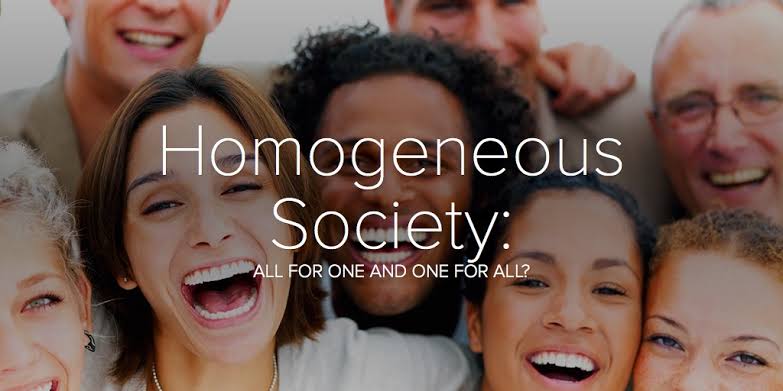
HOMOGENEOUS SOCIETY: all for one and one for all?
- xt202001903
- Mar 12, 2022
- 3 min read
First, First, lets define what is societies, so according to Lumen Learning in sociological terms, society refers to a group of people who live in a definable community and share the same culture. On a broader scale, society consists of the people and institutions around us, our shared beliefs, and our cultural ideas. Typically, more-advanced societies also share a political authority in short it is community or a group of people having common traditions, institutions, and interests, on the other hand homogeneous is the increasing sameness in the world as cultural inputs, economic factors, and political orientations of societies expand to create common practices, same economies. But the question is why the title of this essay is Homogeneous Societies? How it is related to each other?
Societies are now becoming more and more similar and it is because of globalization, why? As we all know that Globalization is defined as the growing interdependence of the world’s economies, cultures, and populations, brought about by cross-border trade in goods and services, technology, and flows of investment, people, and information, in other words it is all about how every country sell or export their products but not just to export but also to import products from another country for their development. There’s a lot of things that makes the societies more similar to each other, and I just want to mention some of these. First as what I’ve mentioned earlier, people, governments and companies are exchanging products, for example people in the societies are buying the products of the other societies and not just they avail it they also use it and as the result they become more and more similar to the other, that’s the first reason, the second one is modern communication, technologies (electronic gadgets) keeps improving day by day that made communication and information transmission easier, faster, less expensive and more efficient, people in the societies are using modern technologies (gadgets) just like what other Societies doing and through this I think they are communicating and exchanging information that makes them similar. And the last but not the least is through music, most the people especially the young/teenager are listening to the same music and got addicted and started to adopt it and they become similar to the other societies who also listen to this.
As a final observation, globalization is happening everyday, many different types of music are becoming part of young people listening preferences and musicians and other artists from all over the world are becoming recognized internationally. Technologies are now also becoming popular and it is use by every single of us in the society for our everyday life, clothing is another area where there is more of a trend towards homogeneity for example we (most) Filipinos especially the teenager are wearing Korean and western-style clothing. So cultural homogeneity are inextricably linked and are changing the way that the world functions in many ways. Media, goods and ideas are flowing freely from country to country, and this is creating a global society that is a mix of all cultures and economies and this make the people or societies similar (Homogeneous Societies).
REFERENCES:
• Longman Dictionary [2014] A homogeneous society is such a society where most of the people share the same type of cultures values, language, ethnicity and religious system.
• Alex Dopico [2019] In fact, globalization is not simply homogenization; on the contrary, it enhances cultural identity. In terms of science, technology and economic development, globalization reflects somewhat the theory of convergence and hegemonic control, but in deeper sense, it promotes cultural identity.
• Chloe Morgenstern-HeidlerMorgenstern-Heidler [November 09, 2021] The main reason being that the homogeneity ensures a foundational basis of shared culture, mannerisms, expectations, etc. by which one’s role and fitness n the society is assessed.
DISCLAIMER (PHOSTO NOT MINE)
https://blogs.transparent.com/korean/the-homogeneous-culture-in-south-korea-in-evolving/
https://express.adobe.com/page/Gu4Jn/




Comments